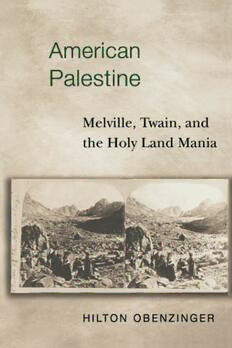
American Palestine: Melville, Twain, and the Holy Land Mania PDF
Preview American Palestine: Melville, Twain, and the Holy Land Mania
American Palestine American Palestine MELVILLE TWAIN AND THE , , HOLY LAND MANIA Hilton Obenzinger PRINCETON UNIVERSITY PRESS PRINCETON, NEW JERSEY Copyright©1999byPrincetonUniversityPress PublishedbyPrincetonUniversityPress,41WilliamStreet, Princeton,NewJersey08540 IntheUnitedKingdom:PrincetonUniversityPress, Chichester,WestSussex AllRightsReserved. LibraryofCongressCataloging-in-PublicationData Obenzinger,Hilton. AmericanPalestine:Melville,Twain,andtheHolyLandmania/HiltonObenzinger. p.cm. Includesbibligraphicalreferencesandindex. ISBN0-691-00728-4(alk.paper).—ISBN0-691-00973-2(pbk.:alk.paper) 1.Melville,Herman,1819–1891.Clarel.2.Palestine—Foreignpublicopinion,American— History—19th century. 3. American literature—19th century—History and criticism. 4. Americans—Travel—Palestine—History—19thcentury.5.Christianpilgrimsandpilgrim- ages in literature. 6. Public opinion—United States—History—19th century. 7. Melville, Herman,1819–1891—Journeys—Palestine.8.Twain,Mark,1835–1910—Journeys—Pales- tine.9.Twain,Mark,1835–1910.Innocentsabroad.10.Palestine—Inliterature.I.Title. PS2384.C530241999 810.9'325694—dc21 99–20728 ThisbookhasbeencomposedinJanson Thepaperusedinthispublicationmeetstheminimumrequirements ofANSI/NISOZ39.48-1992(R1997)(PermanenceofPaper) PrintedintheUnitedStatesofAmerica http://pup.princeton.edu 10 9 8 7 6 5 4 3 2 1 10 9 8 7 6 5 4 3 2 1 (pbk). For Estella Habal Contents Preface:ManiasandMaterialities ix Acknowledgments xix ART NE P O : Excavating American Palestine CHAPTERONE HolyLandsandSettlerIdentities 3 CHAPTERTWO GeorgeSandys:“DoubleTravels”andColonialEncounters 14 CHAPTERTHREE “Christianography”andCovenant 24 CHAPTERFOUR ReadingandWritingSacredGeography 39 ART WO P T : “The Fatal Embrace of the Deity”: Herman Melville’s Pilgrimage to Failure in Clarel CHAPTERFIVE “AProfoundRemove”:AnnihilationandCovenant 63 CHAPTERSIX “ThatStrangePervert”:ThePuritanZionist 84 CHAPTERSEVEN “TheGreatJewishCounterfeitDetector”: WarderCresson,“Carnal”Hermeneutics,andZion’sBody 114 CHAPTEREIGHT Ungar“HisWayEccentric”: TheConfederateCherokee’sMapofPalestine 138 ART HREE P T : The Guilties Abroad: Mark Twain’s Comic Appropriation of the Holy Land in Innocents Abroad CHAPTERNINE AuthorityandAuthenticity 161 viii • Contents CHAPTERTEN TheJaffaColonistsandOtherFailures 177 CHAPTERELEVEN “AWhiteManSoNervousandUncomfortableandSavage” 190 CHAPTERTWELVE “RejectedGospels”:TheBoyhoodofJesus 198 CHAPTERTHIRTEEN ReverenceandRace 216 CHAPTERFOURTEEN The“CultivatedNegro”andtheCurseofHam 227 CHAPTERFIFTEEN DesolatingNarrations:TomSawyer’sCrusade 248 CHAPTERSIXTEEN DesolatingNarrations:“DerJudeMarkTwain” 262 Notes 275 Index 311 Preface Manias and Materialities AFTERFIRSTarranginginEnglandfortheBritishpublicationofTheConfi- dence-Man, Herman Melville arrived in Palestine on January 6, 1857, as part of a modified Grand Tour of Italy, the Ottoman East, and Egypt. Afternearlythreeweeks,muchofitspentwaitingforpassageoutofJaffa, Melville departed. Throughout the course of the next two decades he mulled over the journal entries of that brief encounter, read Holy Land travelbooks,andrecalledhistimespentinPalestine.In1866,atthestart of his long tenure as an inspector for the New York Customs House, he beganClarel:APoemandPilgrimageintheHolyLand,composingthenarra- tivepoemintermittentlyduringhisfirsttenyearsonthewaterfront,finally publishingitintwovolumeswiththefinancialbackingofhisunclePeter Gansevoortin1876.Mostcriticsderidedthelengthy,difficultpoem;and so few readers dared to engage its agonized and agonizing religious dia- logues couched in strangely constricted Hudibrastic verse that Melville wouldendupsellingthebalanceoftheunsoldstockforpulp.Hedescribed Clarel as “a metrical affair, a pilgrimage or what not, of several thousand lines,eminentlyadaptedforunpopularity”—andunpopularityhasbeenits fate ever since.1 Melville spent the rest of his days in growing obscurity, remembered if at all as the “man who lived among the cannibals,” the author of Typee, publishing nothing more in his lifetime other than small volumesofprivatelyprintedversemeantonlyforfamilyandfriends. Samuel Clemens, only just beginning to be known as Mark Twain, de- partedBeirutonSeptember11,1867,withasmallpartyfromtheQuaker CitytourtomakehiswayoverlandviaDamascustoJerusalem.MarkTwain was engaged by newspapers in San Francisco and New York to supply a steadystreamofcorrespondencefromtheQuakerCityexcursion,thefirst suchtouristcruisetobeorganized,andtheWildHumoristofthePacific Slope joined the staid members of the triumphant Northern commercial and industrial elite as they sought to reassert their Old World cultural legacy after the Civil War in their own extended Grand Tour, which in- cludedstopsatTangier,France,Italy,Greece,Russia,andTurkey,aswell as the Holy Land and Egypt. As a consequence, Mark Twain entered the HolyLandaspartofaverypublicperformance,withhissatiriccommen- taries,burlesqueanecdotes, slyjokes,andbumblingexploitsall servedup as“entertainment”foranavid,overwhelminglymalereadership;hewould lateradaptthismaterialforanational,significantlymorefemaleaudience, x • Preface publishingTheInnocentsAbroad,or,TheNewPilgrim’sProgressin1869.Dis- tributed house to house through the somewhat recent innovation of sub- scription sales, Twain’s fictionalized, satirical travel book became an im- mense success, selling, as Twain would remark, “right along just like the Bible.”2InnocentsAbroadwouldbecometheunofficialtourguideforAmeri- canstravelingtotheHolyLand;theyemployedthebook,asdidGeneral Grantonhisworldtour,“rightalong”withtheBible,assuringthepopular- ity its author had first garnered with his vernacular tale of the celebrated jumpingfrog,therebylaunchingthecareerof“MarkTwain,”atrademark thatwouldbecome farmorecelebratedthan theSamClemensof itscre- ation. BothHolyLandbooksbyMelvilleandTwainreachacrossthedivideof the Civil War, as well as across vast differences in genre, reception, and status,aswellastheirrolesinthecareersofeachauthor.WhileClareland InnocentsAbroadhavebeenreadwithinthecontextofthosedistinctcareers in other places, this study will regardMelville’s and Twain’s books in the different light of the ongoing preoccupation with the Holy Land that marked Anglo-American settler-colonial culture throughout the nine- teenth century. Both books are part of a “subgenre” or field of American Holy Land literature based on direct travel to Palestine, a literature in which representations, controversies, and anxieties involving the certain- tiesofreligiousandnationalidentitiescontenduponaheightenedfieldof mythic meanings, with all Holy Land books seeking in one way or other toappropriatePalestinefortheAmericanimagination.WithAmericacon- ceived as the New Jerusalem—an association assumed metaphorically if not always enforced typologically—the old Holy Land was encountered as a terrain of crucialcultural dynamics both challenging and reaffirming America’snarrativeofsettlementasdivineerrand. Giventhis,Melville’sandTwain’stextsremainamongtheleastrepresen- tativewhileyetthemostexpressiveandrevelatoryofthemultitudeofHoly Land books published before the first wave of Jewish colonization began to qualitatively alter Palestine’s political history along with the dynamics of the country’s representation in 1882. Although Melville’s narrative poem could be regarded alongside other biblical verse, such as that by JohnPierpointorBayardTaylor,andTwain’stravelbookcouldbeplaced alongside travel accounts by J. Ross Browne, William Prime, John Lloyd Stephens, Taylor, or others, whatdistinguishes both texts is the way each inscribescomplexresponses,evencounternarratives,onthechargedtablet that Palestine signified to the sensibilities of Anglo-American, Protestant travelers.Whetherpopularorunread,bothtextsengageinreligious,cul- tural, racial, and nationalist discourses in unique ways, starkly revealing certaindark,anxiouspreoccupationsofAmericanculture.
